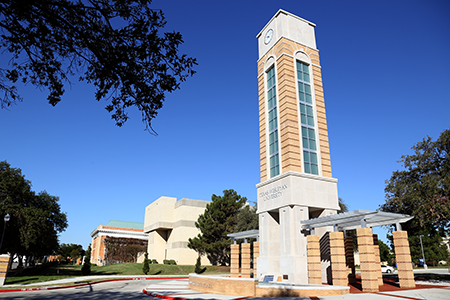Playtime to Ph.D.: Alumna Joyce Alexander's Extraordinary Education Journey
.png)
Did you ever play with dinosaur kits as a child, carefully excavating the tiny bones and assembling your very own prehistoric masterpiece? Or maybe you were more of a toe-counting expert, fascinated by the number of toes these ancient creatures possessed? And let's not forget the burning question on every kid's mind: Could dinosaurs fly? Alumna Dr. Joyce Alexander '87, with her insatiable curiosity, wants to know if your childhood dinosaur adventures led you down the path of working or studying in the awe-inspiring world of science.
Dr. Alexander first came to Texas Wesleyan University with the idea of becoming a child psychologist. But after spending some time participating in undergraduate research, she became interested in educational psychology.
“[The research] really changed the trajectory of what I was going to be when ‘I grow up,’” she said. “I got to take some great classes with Dr. Henderson, and because of that experience, I started thinking about graduate school and really what I could do.”
After graduating from Texas Wesleyan with her bachelor’s in psychology, Dr. Alexander continued her education by getting her Master of Arts and a Ph.D. in Educational Psychology from the University of Georgia.
“I really enjoyed the faculty I met at the University of Georgia,” she said. “I learned a lot about how to do research from some very smart people and how to think about education and psychology.”
Dr. Alexander then landed her first job in higher education as an assistant professor at Indiana University Bloomington, where she stayed for 23 years, raised her family and moved her way up to becoming the executive associate dean.
“I had moved 1,000 miles east to Georgia and then another 1,000 miles north to Indiana,” she said. “[Indiana] was a really supportive environment, which was great because I had no family up there. It was a great place to grow up academically.”
During her time at Indiana University, she authored and co-authored 25 referred research publications and brought in over $300,000 in grant money to focus on the early interests of children in science-related fields. She and fellow researchers were able to uncover the mind-blowing ways childhood play, literature and even TV shows influence the career paths of budding scientists. They voyaged through the lives of these pint-sized scholars, revealing the incredible power of parents and the potential impact of early interests on later involvement in science careers.
If children don't show an early interest in science, Dr. Alexander's work shows that a supportive teacher can still affect a young person's interest, especially in high school.
“It turns out that teachers play a really big role for those kids, and often it's a teacher that pulls aside a young man or woman and says, ‘You're really good at this,’” she said. “I think teachers can open doors for students to get that kind of interest.”
Dr. Alexander's remarkable research didn't stop at mere observations. She knew that teachers played a vital role in shaping young minds, yet many educators faced financial constraints that limited their opportunities. This pushed her to think about how she could continue to help as she became Dean of the College of Education and Human Development at Texas A&M University in 2015.
“One of my goals as dean was to keep the cost down for the teachers that we were training,” she said. “I really try to partner with philanthropic organizations, with corporations, with other nonprofits and with private donors to try to keep the cost down through the creation of endowed scholarships.”
Dr. Alexander was able to raise around $60 million in endowment scholarships through a philanthropic scholarship initiative for future teachers.
With her hard work and dedication, she received the Indiana University Teaching Excellence Recognition Award, the Outstanding Junior Faculty Award, the American Psychology Association Division 15 Outstanding Dissertation Research Award and the University of Georgia College of Education Alumni Award, Lifetime Achievement in Research — just to name a few.
Currently, she is part of a Dean-in-Residence Education Research Policy Fellowship at the American Educational Research Association (AERA) in Washington, D.C. looking at how to make better connections for educational research through better federal policies and budgeting.
“I've learned a lot about how groups come together to really affect people's lives, so it's been very interesting,” she said. “I'm not sure it’s something I want to do forever, but it has been a very interesting fellowship.”
When reflecting on her accomplishments, she thought about Dr. Henderson and how he provided her with great Smaller. Smarter. moments through undergraduate research that propelled her into her career — proving again that teachers make some of the biggest influences on a person’s profession.
She reached out to Dr. Henderson in an email, stating:
“I wear my [Texas] Wesleyan pride often when I talk to people about how I got started in academia. The experiences I had at [Texas] Wesleyan mattered. The experiences I had in your classes mattered. And, honestly, I love the way [Texas] Wesleyan has doubled down on the 'small' motto. Those small classes mattered to me. In my future academic leadership roles, I'll continue to sing the praises of my [Texas] Wesleyan education. I couldn't be prouder.”








